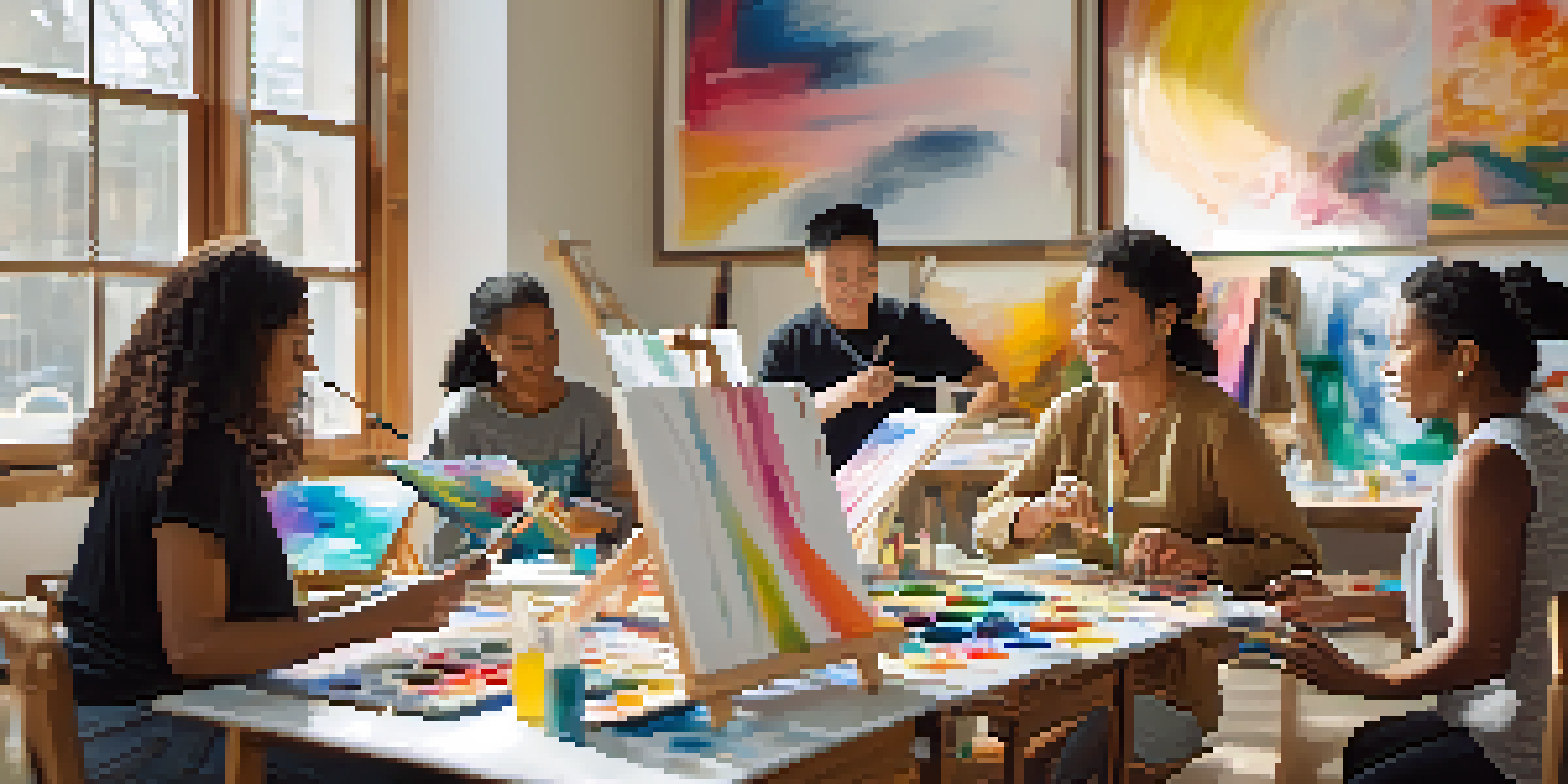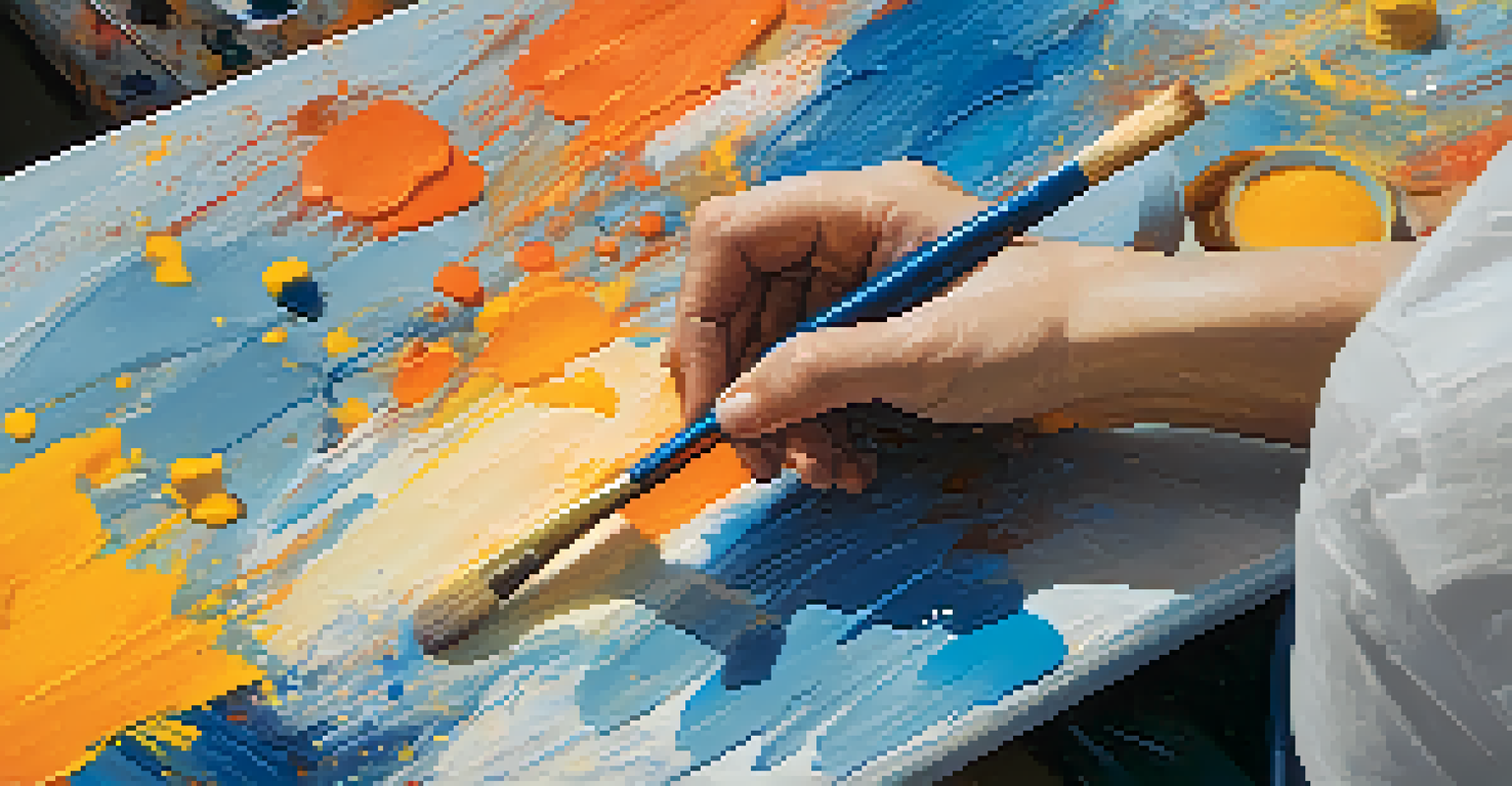Understanding the Benefits of Art in Addiction Recovery

Art as a Healing Tool in Recovery from Addiction
Art can serve as a powerful healing tool for individuals in addiction recovery. It offers a non-verbal means of expression, allowing individuals to communicate feelings that may be too difficult to articulate. This creative outlet can help them process their experiences and emotions, ultimately paving the way for healing.
Art is a way of recognizing oneself, a way of understanding oneself, and a way of healing oneself.
In many cases, addiction stems from unresolved trauma or buried emotions. By engaging in artistic activities, individuals can confront these feelings in a safe environment. This process not only fosters emotional release but also aids in developing a deeper understanding of their struggles.
Moreover, the act of creating art can be therapeutic in itself. It encourages mindfulness, helping individuals stay present and focused, which is crucial in overcoming addictive behaviors. This shift in mindset can play a significant role in their journey toward recovery.
Building Self-Esteem Through Artistic Expression
For many in recovery, low self-esteem is a significant barrier to progress. Engaging in artistic endeavors can help rebuild confidence as individuals create tangible representations of their thoughts and feelings. Completing a piece of art can give a sense of accomplishment, fostering a more positive self-image.

Art also enables individuals to explore their identity beyond addiction. As they discover new skills and talents, they redefine their sense of self, which is crucial for long-term recovery. This process can empower them to see their worth and potential beyond their past struggles.
Art Facilitates Emotional Healing
Art provides a powerful non-verbal outlet for individuals in recovery to express and process complex emotions.
Additionally, sharing their artwork with others can further enhance self-esteem. Whether it's through exhibitions or group therapy sessions, receiving positive feedback can reinforce their progress and encourage them to continue their healing journey.
Fostering Community and Connection Through Art
Art has a unique way of bringing people together, making it an effective tool for building community among those in recovery. Participating in group art activities can help individuals connect with others who share similar experiences, fostering a sense of belonging. This connection can be crucial in combating feelings of isolation that often accompany addiction.
Creativity can be a powerful tool for healing, allowing individuals to express emotions that words cannot convey.
Through collaborative art projects, individuals can learn to communicate and work together, further enhancing their social skills. These interactions can cultivate friendships and support systems that are vital for recovery. Building a network of supportive relationships can provide encouragement and motivation throughout the recovery process.
Moreover, community art programs often provide a safe space for individuals to express themselves without judgment. This acceptance can be incredibly healing, allowing participants to share their stories and learn from one another. Feeling understood and supported can make a significant difference in one's recovery journey.
Enhancing Coping Skills Through Creative Outlets
One of the greatest challenges in recovery is developing effective coping skills. Art offers a constructive way to manage stress and negative emotions, which can be particularly helpful when cravings arise. Engaging in creative activities can distract from triggers and provide a healthier outlet for frustration or anxiety.
Incorporating art into daily routines can teach individuals healthier coping mechanisms. For instance, turning to painting or drawing instead of substance use when faced with stress can help instill resilience. Over time, these creative practices can become a reliable way to navigate life's challenges.
Boosting Self-Esteem Through Creation
Engaging in artistic activities helps rebuild confidence and fosters a positive self-image for those in recovery.
Furthermore, the process of creating art encourages problem-solving and critical thinking. As individuals experiment with different materials and techniques, they learn to face challenges head-on, which is a valuable skill in recovery and beyond. This newfound ability to approach difficulties creatively can foster a sense of empowerment.
Art Therapy: A Structured Approach to Healing
Art therapy is a structured approach that combines psychological principles with artistic expression. It is often facilitated by a licensed therapist, providing a safe space for individuals to explore their feelings and experiences. This professional guidance can enhance the therapeutic benefits of art, making it an effective tool in addiction recovery.
Through art therapy, individuals can delve deeper into their emotions and uncover underlying issues related to their addiction. The therapist can help them navigate these feelings, promoting insight and self-awareness. This process can be transformative, allowing individuals to confront and address the root causes of their addictive behaviors.
Additionally, art therapy can help develop essential life skills, such as patience and perseverance. As participants work through their artistic projects, they learn to appreciate the process rather than just the outcome. This shift in perspective can be incredibly beneficial in fostering resilience and coping strategies for the future.
Exploring Identity and Personal Growth Through Art
Art allows individuals to explore their identity in a safe and creative way. For many in recovery, understanding who they are outside of their addiction can be a significant step toward healing. Creating art can facilitate this exploration, helping them express their unique experiences and perspectives.
As individuals engage with different art forms, they may discover new interests and passions that enrich their lives. This exploration can lead to personal growth and a renewed sense of purpose. By embracing their creativity, they can begin to envision a future filled with possibilities beyond addiction.
Community Support Through Art
Participating in group art activities creates connections and support networks, combating feelings of isolation in recovery.
Moreover, the process of creating art can serve as a reflection of personal growth. As individuals progress in their recovery journey, their artwork may evolve, symbolizing their transformation. This tangible evidence of change can be a powerful motivator, reinforcing their commitment to a healthier lifestyle.
The Lasting Impact of Art in Recovery
The benefits of incorporating art into addiction recovery extend far beyond the creative process. Many individuals find that the skills and insights gained through artistic expression continue to positively influence their lives long after formal recovery programs end. This lasting impact can be a critical factor in maintaining sobriety.
As individuals continue to engage with art, they often develop a lifelong passion that provides ongoing joy and fulfillment. This creative outlet can serve as a healthy coping mechanism and a source of support during challenging times. It can also inspire them to explore other avenues of personal development.

Ultimately, embracing art as a part of recovery can lead to a more enriched and balanced life. The journey may be filled with ups and downs, but the skills and connections made through artistic expression can provide a solid foundation for ongoing growth and healing.